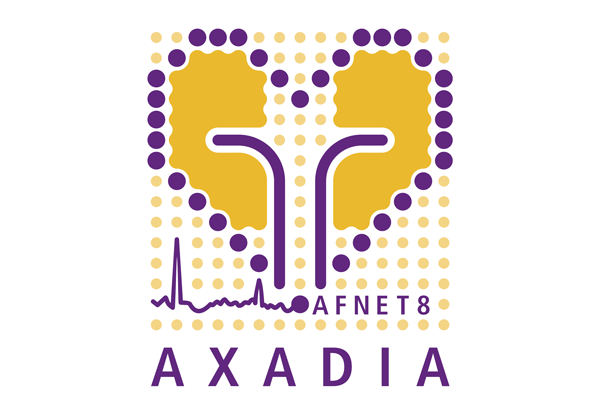
AXADIA-AFNET 8
Safety Study Assessing Oral Anticoagulation with Apixaban versus Vitamin-K Antagonists in Patients with Atrial Fibrillation (AF) and End-Stage Kidney Disease (ESKD) on Chronic Hemodialysis Treatment
Study design
Investigator-initiated, national, open-label, randomised, multicentre, phase IIIb study to evaluate the safety of the new oral anticoagulant apixaban versus the Vitanin-K anatagonist phenprocoumon in the prevention of bleeding and thromboembolic events in patients with chronic kidney disease (CKD stage 5D) with non-valvular atrial fibrillation.

Inclusion Criteria
![]() End-stage kidney disease (ESKD) with chronic hemodialysis treatment 3 times per week (with about at least 3.5 hours per dialysis)
End-stage kidney disease (ESKD) with chronic hemodialysis treatment 3 times per week (with about at least 3.5 hours per dialysis)
![]() Chronic (i.e. repeated) paroxysmal, persistent or permanent atrial fibrillation (AF) or atrial flutter (AFL) documented by standard or Holter ECG on at least 2 separate days before (or apart from) hemodialysis procedures
Chronic (i.e. repeated) paroxysmal, persistent or permanent atrial fibrillation (AF) or atrial flutter (AFL) documented by standard or Holter ECG on at least 2 separate days before (or apart from) hemodialysis procedures
![]() Increased risk of stroke or systemic embolism identified by a CHA2DS2-VASc score of 2 or more as an indication for oral anticoagulation
Increased risk of stroke or systemic embolism identified by a CHA2DS2-VASc score of 2 or more as an indication for oral anticoagulation
![]() Patients with ischemic stroke that meet the above criteria, can be included after more than 3 months if not severely handicapped (modified Rankin scale 0 or 1 of 6, i.e. no symptoms or no significant disability and able to carry out all usual activities, despite some symptoms (Farrell, Godwin, Richards, and Warlow (1991))
Patients with ischemic stroke that meet the above criteria, can be included after more than 3 months if not severely handicapped (modified Rankin scale 0 or 1 of 6, i.e. no symptoms or no significant disability and able to carry out all usual activities, despite some symptoms (Farrell, Godwin, Richards, and Warlow (1991))
![]() Males and females, aged 18 or older
Males and females, aged 18 or older
Exclusion Criteria
![]() AF or AFL due to reversible causes (e.g., thyrotoxicosis, pericarditis)
AF or AFL due to reversible causes (e.g., thyrotoxicosis, pericarditis)
![]() Patients with a new onset of hemodialysis within the last 3 months
Patients with a new onset of hemodialysis within the last 3 months
![]() Clinically significant (moderate or severe) aortic and mitral stenosis
Clinically significant (moderate or severe) aortic and mitral stenosis
![]() Conditions other than AF or AFL that require chronic anticoagulation (e.g., a prosthetic mechanical heart valve).
Conditions other than AF or AFL that require chronic anticoagulation (e.g., a prosthetic mechanical heart valve).
![]() Active infective endocarditis
Active infective endocarditis
![]() Any planned interventional or surgical AF or AFL ablation procedure
Any planned interventional or surgical AF or AFL ablation procedure
![]() Any active bleeding
Any active bleeding
![]() A serious bleeding event in the previous 6 months before screening
A serious bleeding event in the previous 6 months before screening
![]() Inadequately controlled (HbA1c levels >8.5%) or untreated diabetes
Inadequately controlled (HbA1c levels >8.5%) or untreated diabetes
![]() History of malignant neoplasms at high risk of current bleeding (see summary of product characteristics (SmPC) of study drugs)
History of malignant neoplasms at high risk of current bleeding (see summary of product characteristics (SmPC) of study drugs)
![]() Known indication for treatment with NSAIDs (see SmPC of study drugs) – acetylsalicylic acid (ASA) up to 100 mg per day is allowed
Known indication for treatment with NSAIDs (see SmPC of study drugs) – acetylsalicylic acid (ASA) up to 100 mg per day is allowed
![]() Known Antiphospholipid Syndrome requiring anticoagulation
Known Antiphospholipid Syndrome requiring anticoagulation
![]() Impaired liver function e.g., caused by active infection with HIV, HBV or HCV, hepatitis or other liver damage (No limits for ALT and AST values are defined in this study protocol, although mentioned in the SmPC because they are frequently elevated in dialysis patients. In case of clinically relevant increase of ALT or AST level, patient’s eligibility is to be decided by the responsible investigator)
Impaired liver function e.g., caused by active infection with HIV, HBV or HCV, hepatitis or other liver damage (No limits for ALT and AST values are defined in this study protocol, although mentioned in the SmPC because they are frequently elevated in dialysis patients. In case of clinically relevant increase of ALT or AST level, patient’s eligibility is to be decided by the responsible investigator)
![]() Any type of stroke within 3 months prior to baseline
Any type of stroke within 3 months prior to baseline
![]() Other indication for anticoagulation than AF or AFL
Other indication for anticoagulation than AF or AFL
![]() Valvular heart disease requiring surgery
Valvular heart disease requiring surgery
![]() A high risk of bleeding (e.g., active peptic ulcer disease, a platelet count of <100,000 per cubic millimeter or hemoglobin level of <8 g per deciliter)
A high risk of bleeding (e.g., active peptic ulcer disease, a platelet count of <100,000 per cubic millimeter or hemoglobin level of <8 g per deciliter)
![]() Documented hemorrhagic tendencies or blood dyscrasias
Documented hemorrhagic tendencies or blood dyscrasias
![]() Current alcohol or drug abuse
Current alcohol or drug abuse
![]() Life expectancy of less than 1 year
Life expectancy of less than 1 year
![]() Indication for dual platelet inhibition at baseline (ASA ≤ 100 mg/day is allowed, clopidrogel is excluded at any dose).
Indication for dual platelet inhibition at baseline (ASA ≤ 100 mg/day is allowed, clopidrogel is excluded at any dose).
![]() Active infection or symptoms suggestive of COVID-19 infection.
Active infection or symptoms suggestive of COVID-19 infection.
hypothesis
Oral anticoagulation with apixaban will improve the safety by significantly reducing bleeding rates in patients with ESKD on hemodialysis and NVAF compared to the VKA phenprocoumon.
conclusion
In this randomized trial comparing apixaban and VKA in patients with AF on hemodialysis with long follow-up, no differences were observed in safety or efficacy outcomes. Even on oral anticoagulation, patients with AF on hemodialysis remain at high risk of cardiovascular events. Larger randomized trials are needed to determine the optimal anticoagulation regimen for patients with AF on hemodialysis.
PATIENTS
Sites in Germany
Study procedure
Start of study
2017
End of study
2022
Study information for download
Publications
Reinecke H, Engelbertz C, Bauersachs R, Breithardt G, Echterhoff H, Gerss J, Haeusler KG, Hewing B, Hoyer J, Juergensmeyer S, Klingenheben T, Knapp G, Rump LC, Schmidt-Guertler H, Wanner C, Kirchhof P, Goerlich D. 2022. A randomized controlled trial comparing apixaban to the vitamin Kantagonist phenprocoumon in patients on chronic hemodialysis – the AXADIA – AFNET 8 study. Circulation 06.11.2022. doi: 10.1161/CIRCULATIONAHA.122.062779
Reinecke H, Jürgensmeyer S, Engelbertz C, et al. Design and rationale of a randomised controlled trial comparing apixaban to phenprocoumon in patients with atrial fibrillation on chronic haemodialysis: the AXADIA-AFNET 8 study. BMJ Open 2018 Sep 10;8:e022690. doi: 10.1136/bmjopen-2018-022690
Coordinating Investigator

Prof. Holger Reinecke
Münster

Prof. Christoph Wanner
Würzburg
More information
sponsor
Legaler Sponsor nach EU Direktive 2001/ 20/ EC:
Kompetenznetz Vorhofflimmern e.V. (Atrial Fibrillation NETwork, AFNET), Münster, Germany